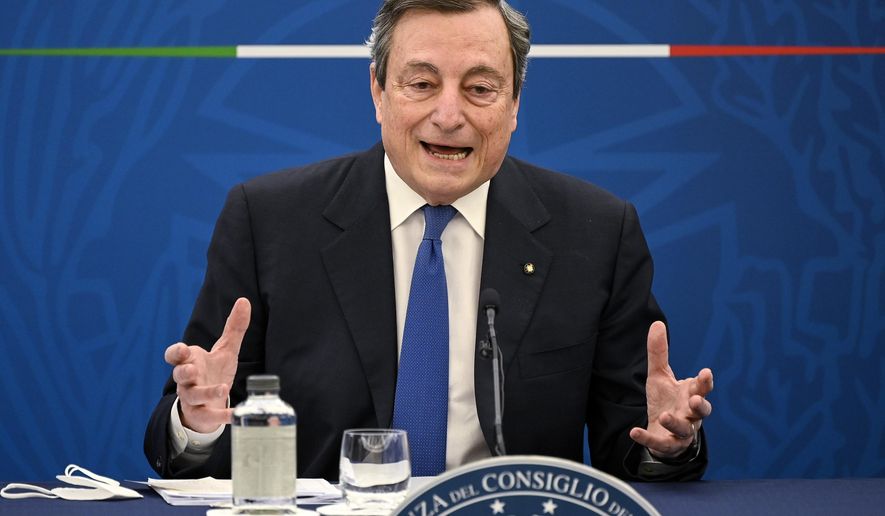ROME (AP) - Turkey demanded an apology Friday from Italy’s premier for having called President Recep Tayyip Erdogan a “dictator,” a comment that added fuel to a dispute over a perceived seating snub involving a top European Union official.
The comment also deepened an EU-Turkey rift at a time when the two sides had hoped for a rapprochement.
Italian Premier Mario Draghi made the uncharacteristically undiplomatic comment Thursday at the end of an hour-long news conference devoted to Italy’s coronavirus pandemic response. He was asked his reaction to Erdogan’s treatment of European Commission President Ursula von der Leyen, who was left without a chair during a Tuesday meeting in Ankara.
Draghi said Erdogan’s behavior was inappropriate and that he was sorry for the “humiliation” von der Leyen had suffered.
“It’s that with these - let’s call them what they are - dictators, who, however one needs … one must be frank in expressing differences of views, opinions, behavior, of visions of society … but also be ready to collaborate, more to cooperate, to collaborate to ensure the interests of one’s country.”
Turkey summoned Italy’s ambassador to protest, and a presidential spokesman demanded that Draghi retract his words.
“We strongly condemn this rhetoric, which has no place in diplomacy. If Mario Draghi is looking for a dictator, he should look no further than Italy’s history,” Erdogan’s communications director, Fahrettin Altun, said Friday.
As of Friday evening, Draghi had not apologized publicly or issued a retraction.
Turkey has strongly rejected the allegation that von der Leyen was snubbed and insisted it followed the EU’s own protocols in making the seating arrangements. Von der Leyen and European Council President Charles Michel traveled to Ankara for talks on Turkey-EU relations. Only two chairs were set out in front of the EU and Turkish flags for the three leaders.
Von der Leyen watched as the men took the chairs, expressing her astonishment with an “ehm” sound and a gesture of disappointment. She was later seated on a large beige sofa, away from Michel and Erdogan.
Michel, for his part, issued a muted mea culpa for his failure to protest the seating arrangement, and said if he could do it again, he would have made sure it showed “respect for everyone.”
Michel also said he feared that if he had actively objected, “months of political and diplomatic efforts” to forge better relations with Turkey would have been lost.
The visit was supposed to have marked a new phase of relations between the EU and Turkey after months of wrangling over everything from women’s rights to drilling for gas in disputed waters in the eastern Mediterranean.
The meeting was supposed to center on improved cooperation on migration and trade, while the EU raised some human rights and rule of law issues, including about Erdogan’s decision to pull Turkey out of a key European convention aimed at combating violence against women. All were supposed to seize on a recent conciliatory tone from Erdogan and pave the way for an EU summit in June to cement improved bilateral relations.
Daniel Holtgen, spokesperson for the Council of Europe’s secretary general, said both the incident over the seating arrangement and the timing were “very unfortunate,” given Turkey’s withdrawal from the Council’s Istanbul Convention on combating domestic violence.
Turkish Deputy President Fuat Oktay defended Erdogan, saying the Turkish leader had opposed “all kinds of fascism and tutelage” and “won every election with the highest respect of his people.”
“I invite Draghi to apologize,” he said.
Draghi’s remarks found support across the political spectrum in Italy. Democratic Party lawmaker Lia Quartapelle tweeted that “Draghi said it like it is,” and right-wing firebrand Matteo Salvini expressed “solidarity and esteem” for Draghi’s assessment.
“The intimidation and discrimination by the dictator Turk Erdogan are inacceptable,” said Salvini, who has long demanded that Turkey be kept out of the European Union.
A spokeswoman for German Chancellor Angela Merkel was asked Friday about the seating spat and Draghi’s comment. The spokeswoman said Germany had no comment on either.
___
AP correspondent Raf Casert contributed from Brussels. Fraser reported from Ankara.




Please read our comment policy before commenting.